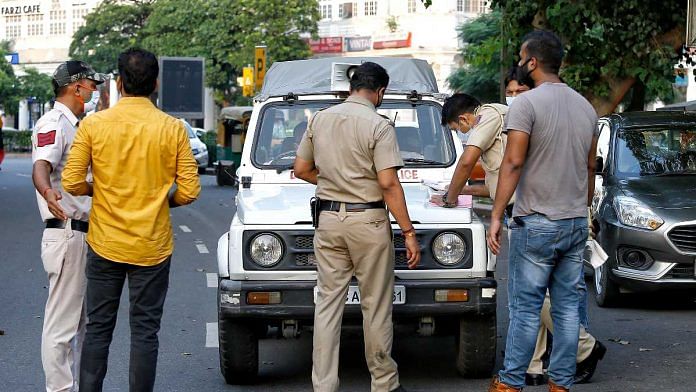
New Delhi: The year 2020 witnessed a nearly 90 per cent drop in the number of challans issued for drink driving in the national capital as compared to 2019.
Only 3,986 challans were issued by the Delhi Traffic Police in 2020, when the pandemic put India under one of the world’s strictest lockdowns, as compared to the 36,065 challans issued the previous year, ThePrint has learnt.
The police stopped using breathalysers with the outbreak of Covid-19.
The lockdown, which was imposed from the midnight of 24 March, began easing up in June, but many areas remained sealed in the following months since they were within containment zones. This meant most people still kept indoors and very few vehicles out on the roads.
This resulted in a drop in road accidents as well in the national capital. In 2020, as many as 4,178 accidents were reported, a 25 per cent drop from the 5,610 accidents recorded in 2019.
Other cities also see drop in numbers
Several other cities across India also witnessed a major drop in drink driving challans.
In Hyderabad, the number of challans dropped by 81 per cent in 2020. Official statistics show that 29,756 people were issued challans for the offence the year before as against the 5,590 in 2020.
In Kolkata, the number came down from 8,571 in 2019 to 2,005 in 2020, a difference of around 76 per cent, according to data shared by a top officer.
Chennai saw a 49 per cent difference between 2020 and 2019 — 24,439 challans last year compared to 48,336 in 2019.
Bengaluru also recorded a major drop — 86 per cent — with only 5,343 challans being issued in 2020 as compared to the 40,602 in 2019. Traffic police officers, however, said the 2020 figure only covers the months of January, February and March, before lockdown was imposed.
“Challaning was done for the first three months, after that we stopped due to Covid as we could no longer use breathalysers. We did some challaning after lockdown, but no data was maintained,” a Bengaluru police officer said.
Breathalyser tests not returning just yet
Delhi Traffic Police officers said the drop in the number of challans for drink driving, even with vehicular movement resuming, is mostly due to a lack of carrying out breathalyser tests. However, there are no plans to resume them for now.
“We stopped the use of breathalysers at the beginning of the coronavirus pandemic. Drink driving has since been mostly detected through routine checks, dangerous and risky driving and other violations,” a senior Delhi Traffic Police officer, who asked to not be named, told ThePrint.
The officer added that though the national vaccination drive has begun, breathalyser tests won’t be resumed anytime soon.
“A conscious decision to not use breathalysers has been taken to avoid spreading the infections… the situation remains risky. This is for the safety of citizens as well as police personnel,” the officer added.
Police officers from Chennai, Bengaluru and Hyderabad echoed similar concerns, though they conceded that the lack of the test meant fewer challans.
“Earlier we carried out extensive drunk driving checks at various checkpoints. The fine amount levied is also high. In some extreme cases, we would even seize the cars and send the accused to court,” a senior Hyderabad Traffic Police officer told ThePrint.
In the Telangana capital, as many as 629 people were arrested and produced in court last year as compared to 4,501 in 2019.
Under the new Motor Vehicles Act, implemented from April 2020 in Delhi, the first drink driving offence is punishable with up to six months in jail and/or a fine of Rs 10,000, up from the earlier fine of Rs 2,000. For repeated offences, one could be imprisoned for upto two years and/or be fined upto Rs 15,000.
Subscribe to our channels on YouTube & Telegram
Why news media is in crisis & How you can fix it
India needs free, fair, non-hyphenated and questioning journalism even more as it faces multiple crises.
But the news media is in a crisis of its own. There have been brutal layoffs and pay-cuts. The best of journalism is shrinking, yielding to crude prime-time spectacle.
ThePrint has the finest young reporters, columnists and editors working for it. Sustaining journalism of this quality needs smart and thinking people like you to pay for it. Whether you live in India or overseas, you can do it here.